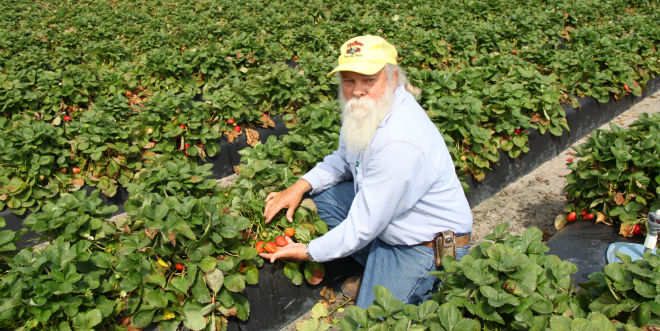

Aug 12, 2017Fancy Farms president plans to step down
“Since 1974 and still learning” is the business philosophy of Carl Grooms, a longtime strawberry grower in central Florida.
Grooms is president and co-founder of Fancy Farms, a Plant City growing operation. He and his wife, Dee Dee Grooms, co-own Fancy Farms.
The veteran strawberry grower has weathered many disappointing seasons. Harvesting usually begins in November and ends by early April. During the 2016- 17 season, the third-generation farmer grew 170 acres of strawberries, down from the 230 acres he grew in 2015-16. Grooms reduced acreage after selling off his main farm for development of a dry storage warehouse.


After graduating high school, Carl Grooms farmed for another grower, then decided to go on his own. At 25, he started his farming with James Crocker, a citrus tycoon who became Grooms’ financial partner. Dee Dee Grooms later purchased Crocker’s ownership after Crocker retired. During the 1970s, when the berry industry was increasing in acreage, Crocker took Grooms under his wings.
“I had the want-to, he had the finances,” Grooms said.
This summer, Grooms’ son, Dustin, 36, plans to take over the business. The younger Grooms managed the 2016- 17 crop cycle. In 2007, Dustin joined the operation as farm manager after working in the U.S. Army, where he was a transportation specialist and drill sergeant.
Dustin isn’t deterred by the time and responsibility required when farming, his father said.
“There’s a lot of new rules and government regulations and things coming down the pike that eat me up,” Grooms said. “Those overwhelm me, but he’s able to handle them. I’m from the old-school, where a farmer made up his mind and did it. Today, you’re not allowed to do that anymore. You have to first ask, ‘Mother, may I?’”
There are many challenges growers face today that Grooms didn’t have to deal with when he started farming. These include labor, which remains critical. Water is another issue. Sourcing sufficient water is difficult, as growers wanting to drill wells are required to go through a highly complicated system to obtain permits. The region’s water management system tells growers when they can and cannot run their water.
“The farmer knows best about that issue on their own farm,” Grooms said. “There are none of us that would run excessive water just to see it run. It costs money to run this water, and if in excess is a detriment to your crop. It’s common sense, but we still have to go by all this.”
Paperwork is another headache. Folders filled with paperwork, including paper dealing with the H-2A program, litter Grooms’ office. His late mother, Willa, used to operate the books on their dining room table out of a cigar box. The family used an adding machine, but no filing cabinets. The complexity of rules today requires growers to use much more, including computers.
A key to successfully growing strawberries in Florida includes dedication to the land. Driving around his fields, Grooms pointed to a neighbor’s field, where the many dead plants covering old plastic beds displayed neglect.
“In the strawberry farming operations I do, it’s very important to put footsteps and shadows on the ground daily to really observe your crops,” Grooms said. “I see a lot of farmers that don’t, and their crops show it. Nowadays, you have four-wheel drive window farmers. You have to get out and go feel the dirt.”
Wish Farms, one of Florida’s largest berry growers and marketers, has long sold Grooms’ fruit to retailers throughout the United States. For three years, however, Grooms decided to try his own hand at sales. He hired a veteran strawberry salesman. The trouble was that Grooms couldn’t persuade enough growers to let him market their crops. The sales operation wasn’t profitable, and Grooms learned from it. He returned to Wish Farms.
A wall in Grooms’ home office is lined with awards and honors. He has been recognized by the Florida Strawberry Growers Association for his production skills. In 2013, he was named Agriculturist of the Year by the Greater Plant City Chamber of Commerce.
“If you’re not learning, you aren’t moving forward,” he said.
— Doug Ohlemeier, VGN correspondent














